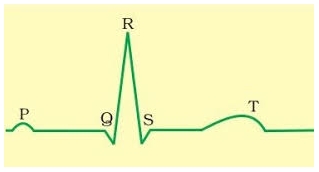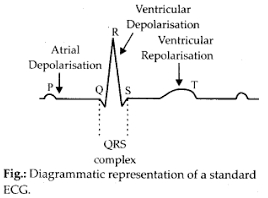CBSE Class 11 Biology – MCQ and Online Tests – Unit 18 – Body Fluids and Circulation
Every year CBSE schools conducts Annual Assessment exams for 6,7,8,9,11th standards. These exams are very competitive to all the students. So our website provides online tests for all the 6,7,8,9,11th standard’s subjects. These tests are also very effective and useful for those who preparing for any competitive exams like Olympiad etc. It can boost their preparation level and confidence level by attempting these chapter wise online tests.
These online tests are based on latest CBSE syllabus. While attempting these our students can identify the weak lessons and continuously practice those lessons for attaining high marks. It also helps to revise the NCERT textbooks thoroughly.
CBSE Class 11 Biology – MCQ and Online Tests – Unit 18 – Body Fluids and Circulation
Question 1.
Which of the following statement/statements can be related to erythroblastosis foetalis?
(a) Severe anemia and jaundice to the baby.
(b) Can be avoided by giving anti-Rh antibodies to mother immediately after delivery of the first child.
(c) Rh-antibodies from the Rh -ve mother destroys foetal RBCs.
(d) All of the above
Answer
Answer: (d) All of the above
Explanation:
Erythroblastosis foetalis occurs if Rh-antibodies from the Rh -ve mother destroys foetal RBCs of Rh +ve foetus.
Question 2.
What is the normal blood pressure of human beings?
(a) 110/70
(b) 120/70
(c) 120/80
(d) 110/80
Answer
Answer: (c) 120/80
Explanation:
120/80 is the normal measurement to blood pressure.
120 mm Hg is the systolic or pumping pressure.
80 mm Hg is the diastolic or resting pressure.
Question 3.
Among the following stem cells, which are found in the umbilical cord?
(a) Cord blood stem cells
(b) Adult stem cells
(c) Embryonic stem cells
(d) All of the above
Answer
Answer: (a) Cord blood stem cells
Question 4.
An adult human has systolic and diastolic pressures as:
(a) 80 mm Hg and 120 mm Hg
(b) 120 mm Hg and 80 mm Hg
(c) 50 mm Hg and 80 mm Hg
(d) 80 mm Hg and 80 mm Hg
Answer
Answer: (b) 120 mm Hg and 80 mm Hg
Question 5.
Duration of cardiac cycle is
(a) 0.7 sec
(b) 0.9 sec
(c) 0.8 sec
(d) 0.11 sec
Answer
Answer: (c) 0.8 sec
Explanation:
Duration of cardiac cycle is 0.8 seconds.
Question 6.
In the above picture Q represents
(a) exitation of the atria
(b) depolarisation of ventricles
(c) begining of systole
(d) repolarisation
Answer
Answer: (c) begining of systole
Explanation:
Question 7.
Oxygenated blood occurs in
(a) Pulmonary artery
(b) Right atrium
(c) Right ventricle
(d) Pulmonary vein
Answer
Answer: (d) Pulmonary vein
Question 8.
The cells lining the blood vessels belong to the category of
(a) Columnar epithelium
(b) Connective tissue
(c) Smooth muscle tissue
(d) Squamous epithelium
Answer
Answer: (d) Squamous epithelium
Question 9.
Heart failure occurs due to
(a) heart stops beating
(b) damage of heart muscles
(c) congestion of lungs
(d) all of the above
Answer
Answer: (c) congestion of lungs
Explanation:
Heart failure occurs when heart stops pumping blood effectively enough to meet the body needs.
It occurs mainly due to congestion of lungs.
Question 10.
Arteries are best defined as the vessels which
(a) Carry blood from one visceral organ to another visceral organ
(b) Supply oxygenated blood to the different organs
(c) Carry blood away from the heart to different organs
(d) Break up into capillaries which reunite to form a vein
Answer
Answer: (c) Carry blood away from the heart to different organs
Question 11.
Christmas disease is also known as
(a) Haemophilia B
(b) AIDS
(c) Haemophilia A
(d) Haemolytic jaundice
Answer
Answer: (a) Haemophilia B
Question 12.
Artificial pace maker is transplanted in
(a) Inter auricular septum
(b) Below the collar bone
(c) Inter ventricular septum
(d) Right auricle
Answer
Answer: (b) Below the collar bone
Question 13.
If vagus nerve is cut the heart beat
(a) increases
(b) decreases
(c) will not be affected
(d) will stop immediately
Answer
Answer: (a) increases
Question 14.
If due to some injury the chordae tendinae of the tricuspid valve of the human heart is partially non-functional, what will be the immediate effect?
(a) The flow of blood into the pulmonary artery will be reduced
(b) The flow of blood into the aorta will be slowed down
(c) The pacemaker will stop working
(d) The blood will tend to flow back into the left atrium
Answer
Answer: (a) The flow of blood into the pulmonary artery will be reduced
Question 15.
In developing embryo RBCs are formed in
(a) Lymph node
(b) Bone marrow
(c) Liver
(d) Spleen
Answer
Answer: (c) Liver
Question 16.
In humans, blood passes from the post caval to the diastolic right atrium of heart due to:
(a) Pressure difference between the post caval and atrium
(b) Pushing open of the venous valves
(c) Suction pull
(d) Stimulation of the sino auricular node
Answer
Answer: (a) Pressure difference between the post caval and atrium
Question 17.
Heparin is
(a) Anti-allergic
(b) Blood diluter
(c) Anticoagulant
(d) Antiseptic
Answer
Answer: (c) Anticoagulant
Question 18.
An adult human has systolic and diastolic pressures as:
(a) 80 mm Hg and 120 mm Hg
(b) 120 mm Hg and 80 mm Hg
(c) 50 mm Hg and 80 mm Hg
(d) 80 mm Hg and 80 mm Hg
Answer
Answer: (b) 120 mm Hg and 80 mm Hg
Question 19.
Cardiac arrest is the state when
(a) heart stops beating
(b) inadequate blood supply to the heart
(c) heart not pumping enough to meet the body needs
(d) blood pressure increases
Answer
Answer: (a) heart stops beating
Explanation:
Cardiac arrest occurs when the heart stops beating.
Question 20.
When body tissues are injured resulting in the loss of blood, the process of blood clot begins and the blood platelets release
(a) Fibrinogen
(b) Thrombin
(c) Prothrombin
(d) Thromboplastin
Answer
Answer: (d) Thromboplastin













0 Comments:
Post a Comment